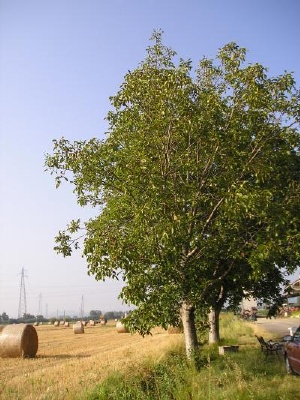Aug 13 2008
One in five of Germany's plant species could lose parts of its current range, a study by scientists at the Helmholtz Centre for Environmental Research (UFZ), the Potsdam Institute for Climate Impact Research (PIK) and the French Laboratoire d'Ecologie Alpine reveals. Species distributions will be rearranged as a result of climate change; this could have a dramatic impact particularly on the vegetation in south-western and eastern Germany. The researchers have modelled and recorded how the ranges of a total of 845 European plant species will shift under three different future scenarios. Even moderate climate change and limited land use changes could have an adverse impact on flora, the researchers write in the current edition of Biology Letters. The research shows how important it is to limit global warming to two degrees Celsius above the pre-industrial level in order to preserve broad biodiversity in plant species.
 A winner of climate change: the range of walnut (Juglans regia) increases. This species is projected to find suitable mild climate in larger areas of Germany due to global warming. Credit: Photo: Franz Badeck/PIK
A winner of climate change: the range of walnut (Juglans regia) increases. This species is projected to find suitable mild climate in larger areas of Germany due to global warming. Credit: Photo: Franz Badeck/PIK
Sven Pompe and his colleagues from UFZ evaluated the potential impact of climate change on the distribution of 845 European plant species, 550 of which are currently found in Germany. The research team, which included Franz Badeck from PIK, used climate and land use scenarios up to 2080 based on possible temperature increases of 2.2, 2.9 or 3.8 degrees Celsius. The impacts of climate change will result in local losses of flora. The reduction in the ranges of plants is a general trend, although some central and southern European species move in which were not previously recorded in Germany. The impacts will vary locally, with the greatest reduction in species richness likely to take place in north-eastern and south-western Germany. The effects in the simulations become greater as the temperature increases. With moderate warming of about 2.2 degrees Celsius, about seven percent of species will lose more than two-thirds of their current ranges. This increases to eleven percent at a warming of 2.9 degrees Celsius and twenty percent at 3.8 degrees Celsius. The fact that the extent of change increases disproportionately to the projected increase in temperature argues in favour of the European Union's stabilisation target of two degrees Celsius in order to protect biodiversity. Saarland, Rhineland Palatinate and Hesse and the lowland plains of Brandenburg, Saxony-Anhalt and Saxony could suffer particularly high species losses. In contrast, the researchers expect the number of species in the low mountain ranges of Baden-Württemberg, Bavaria, Thuringia and Saxony to increase slightly, with some plants moving in. However, for this to happen these species would actually have to reach these areas: climate change could take place too quickly for most plant species to adapt or migrate in line with the shifts in ranges - polewards or to higher altitudes.
"Many plant species could lose their niches in habitats such as mountains or moors," Sven Pompe from UFZ explains. Migrating species from southern Europe could not compensate for these losses in the models. The marsh marigold (Caltha palustris), for example, is one of the losers to climate change. The changes in the environmental conditions in the scenarios will result in this species disappearing locally from the low-lying areas of Brandenburg, Saxony-Anhalt and Saxony. In contrast, the common walnut (Juglans regia), originally introduced north of the Alps by the Romans, would find more areas with suitable conditions and could extend into eastern Germany.